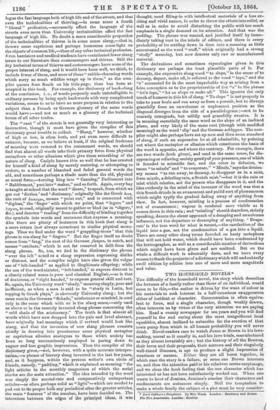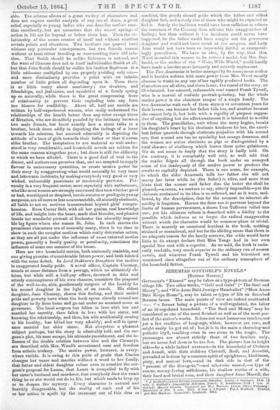TWO HOUSEEIOLD NOVELS.*
THE difficulty of the household novel, the story which describes the fortunes of a family rather than those of an individual, would seem to be this,—the author is driven by the want of colour in his materials to seek interest in a half-conscious exaggeration either of incident or character. Concentration is often equiva- lent to force, and a single character, though weakly drawn, often interests us by virtue of the very attention we are paying him. Read a county newspaper for ten years and you will find yourself in the end caring about the most insignificant local squabbles, almost inclined to subscribe for the erection of that town pump from which in all human probability you will never drink. Novel-readers care to watch Jones or Brown in his love- making, unreal as it usually is, and his love trials, manufactured as they almost invariably are ; but the history of all the Browns, their loves and their proposals, their sorrows and their singularly well-timed illnesses, is apt to produce a slight impression of weariness or nausea. Either they are all bores together, in which case the story is a failure, or some one Brown interests us, and then the attention paid to his relatives seems surplusage, and we close the book feeling that the one character which has interested us has not been satisfactorily worked out. When one wants to hear of Jemima, Jeinima's cousins their characters and confinements are nuisances simply. Still the temptation to make a whole family the subject of a plot must be very consider-
• Lord althorn s Daughters. By Mrs. Wood. Lyndon : Bradbury and Evans.
The Two Anastasia& London: Bentley. able. The scheme allows of a great variety of characters and does not require careful analysis of any one of them, a great relief, especially to young ladies who can describe surface emo- tion excellently, but are conscious that the secret springs of action in life are far beyond or below their ken. Then the re- lationship of the actors creates of itself and without exertion certain points and situations. Two brothers can quarrel hard without any particular consequences, but two friends cannot without at least either breaking or recementing their old rela- tion. That Smith should be unlike Robinson is natural, and the want of likeness does not in itself individualize Smith at all, but that John Smith should be unlike his brother Septimus. is a little odd—one multiplied by one properly yielding only one— and mere dissimilarity provides a point with an infinite number of little points all depending upon it. Then there is so . little worry about machinery ; the rivalries, and friendships, and jealousies, and squabbles of a family spring up so naturally, while there is the great compressing force of relationship to prevent their exploding into . any form too bizarre for credibility. Above all, half our novels are written by half-experienced women, who really understand the relationships of the hearth better than any other.except those of flirtation, who are dreadfully puzzled by the intimacy between two male friends, but know exactly how a sister talks to a brother, break down oddly in depicting the feelings of a lover towards his mistress, but succeed admirably in depicting the attitude of a knot of girls towards their father or that tiresome elder brother. The temptation to use material so well under- stood is very considerable, and household novels are seldom for the same reasons altogether pear; but there is still the difficulty to which we have alluded. There is a good deal of veal iu the dinner, and authoresses perceive that, and are tempted to supply flavour in unnecessary quantities, to create motive power for their story by exaggerating what would naturally be very tame and lukewarm incidents, by making everybody very good or very wicked, unbearably passionate or intolerably perverse. Per- versity is a very frequent motor, more especially with authoresses, who like most women are strongly convinced that men whether good or bad, worshipped or despised, heroic curates or profligate young surgeons, are all more or less unaccountable, all absurdly obstinate, all liable to act on motives transcendent beyond girls' compre- hension. Even Currer Bell, with all her genius, real knowledge of life, and insight into the heart, made that blunder, and planted beside her wonderful portrait of Rochester the absurdly impossi- ble la/ figure whom she names St. John. In such stories the prominent characters are of necessity many, there is no time to show in each the complex motives which really determine action, so they are all put under the influence of some external motive power, generally a family quality or peculiarity; sometimes the influence of some one member of the house.
Here are two household stories, both eminently readable, and one giving promise of considerable future power, and both tainted with the same defect. In Lord Oakburn's Daughters the motive is exaggerated family pride. A naval officer, Captain Chesney, stands at some distance from a peerage, which he ultimately ob- tains, but while still a half-pay officer, drowned in debt and utterly contemptuous of his own chances, considers the proposal of the well-to-do, able, gentlemanly surgeon of the locality for his second daughter in the light of an insult. His eldest daughter, Jane Chesney, shares this feeling, and their united pride and poverty have when the book opens already caused one daughter to fly from home and go out under an assumed name as governess. The local surgeon has fallen in love with her and married her secretly, then fallen in lova with her sister, not knowing the relationship, and then, his wife accidentally coming to his locality, has killed her very adroitly, and still in ignor- ance married her elder sister. Not altogether a pleasant subject perhaps, but the story is admirably told, and the sur- geon's plot, his near escape, his ultimate punishment, and the in- fluence of the double relation between him and the Chesneys, are described with Mrs. Wood's accustomed ease and freedom from artistic trickery. Tho motive power, however, is every- where visible. It is owing to this pride of grade that Clarice changes her name and marries without a word to her family, that father and eldest daughter refuse even to consider the sur- geon's proposal for Laura, that Laura is compelled to fly with her sister's husband and murderer, that everybody does the exact, thing he or she would not do in life, but which tends to keep up or to deepen the mystery. Every character is natural and horribly disagreeable, but the reality of each and of his or her action is spoilt by the incessant use of this. dens ex machind, this greedy absurd pride which the father and eldest daughter feel, and nobody else of those who might be expected to fed it. Surely the incidents would have been sufficient to relieve the tameness of the Chesney lives without this exaggeration of feeling ; but then without- it tie incidents -could never have happened, for the father would have sought out his governess daughter and would not have raved at the surgeon, and Lady Jane would not have been so impossibly dutiful or exasperat- ingly punctilious. We have an idea, by the way, that Mrs. Wood intended this woman to be rather a model, but Mrs. Bar- bauhl, or the author of the " Wide, Wide World," could hardly have made a heroine more intensely and actively unpleasant.
The Two Anastasias is better managed by its anonymous author and is besides written with more power than Mrs. Wood usually chooses to waste on any one of her rapidly produced books. The characters are all alive, and there is one, the rascal of the story, an ill-educated, low-natured, redeemable roué named Frank Tyrrell, who is a marvel of realistic portrait-painting, but the whole motive power is the obstinate temper of a single family. The two Anastasias wait each of them sixteen or seventeen years for their lovers, one because her father bids her, and another because she cannot help it, but both with a rigidity of purpose sugges- tive of anything but the affectionateness it is intended to ascribe to them. The grandfather, with whom the story begins, breaks his daughter's heart by his obstinate kindness for her, the excel- lent father quarrels through obstinate prejudice with his second son, that second son has no speciality but savage dourness, and the women are either obstinate as pigs or distinguished by a total absence of obstinacy which leaves them quite gelatinous. We do not mean to imply that the story is badly told. On the contrary, it is remarkably well told, so well told that the reader fidgets all. through the book under an annoyed sense of the inadequacy of the motive power to produce the results so capitally depicted. There is one scene, for example, in which the elder Anastasia tells her father she will not marry her lover while he (the father) is alive, and more than hints that the sooner said father dies the better she shall be pleased,—a scene, we venture to say, utterly impossible—yet the violence contained in its idea is so softened, and as it were, mel- lowed, by the description, that for the moment its inherent ab- surdity is forgotten. Horace the dour son is perverse beyond the limits of human perverseness, a dozen Tom Tullivers rolled into one, yet his ultimate reform is described with a fidelity to the possible which induces us to forget the radical exaggeration without which the character would be common-place or trivial. There is scarcely an unnatural incident in the book, nothing strained or sensational, and but for the abiding sense that there is no adequate reason for the family sorrows, the critic would have little to do except declare that Miss Yonge had in her own special line met with a superior. As we said, the book is emin- ently readable, very much superior to the ordinary run of season novels, and wherever Frank Tyrrell and his betrothed are mentioned rises altogether out of the ordinary atmosphere of the household fiction.































 Previous page
Previous page